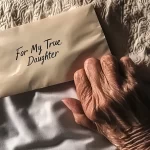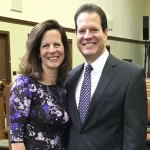The day I confronted my aunt and uncle with the truth, I watched their faces drain of color. Eight years of lies crumbled in seconds. They had stolen everything from me—my inheritance, my home, and the memory of my parents. But as the saying goes, revenge is best served with cold, hard evidence.
The people who claim to protect you can sometimes be the very ones you need protection from. I learned that the hard way. But I also discovered something important: even when everything seems hopeless, justice can still win.
It all began when I was ten years old, and my world came crashing down.
It was a typical Saturday—cartoons on the TV, a half-eaten bowl of cereal sitting beside me, and the comforting thought that Mom and Dad would be home soon with groceries. The babysitter, Jenna, was on the couch, texting, only half aware of me.
“They should’ve been back by now,” she said, glancing at the clock for the third time in ten minutes.
I just shrugged, unconcerned. Sometimes, Dad would take Mom to that little coffee shop she loved after shopping. They deserved a break together.
The doorbell rang at 3:42 p.m.
I remember that moment clearly because I had just checked the clock myself, wondering if there’d be enough time to bake cookies like Mom had promised.
It wasn’t my parents standing at the door. It was Aunt Margaret and Uncle David. Behind them stood a police officer.
“Amelia, honey,” Aunt Margaret said, kneeling down to my level. Her voice shook with emotion. “Something bad has happened.”
The words she said next didn’t fully register in my mind. Car accident. Instantaneous. They didn’t suffer. It was all that adult language meant to make death seem less harsh to a child.
The funeral, I remember in pieces—black clothes, quiet voices, strangers telling me how sorry they were.
I remember standing between Aunt Margaret and Uncle David, their hands on my shoulders, offering what they must have thought was comfort, as I stared at two caskets.
They told me that my parents would never return, and part of me, the part that still believed in magic and miracles, died right there.
“You’ll come live with us now,” Uncle David said, his voice steady but lacking warmth. “We’ll take care of everything.”
Everything included my home. The house where my parents had raised me—the two-story colonial with the big backyard, the one where Dad had built me a treehouse, and where Mom had taught me to bake cinnamon rolls in the kitchen. The living room where we had movie nights every Friday.
“We’ll take care of it,” they promised, smiling with false reassurance.
But they didn’t.
They moved me into their home, into the basement. They called it my “special space,” but it was dark, musty, and smelled like laundry detergent and old boxes. My clothes hung on a metal rack instead of being neatly stored in a closet.
My bed was an old futon that creaked every time I shifted.
As for my parents’ house—the one that used to be mine—they rented it out. My childhood bedroom became someone else’s. My mom’s garden, the one she’d lovingly cared for with roses, hydrangeas, and herbs, was paved over to create extra parking.
“It’s what makes financial sense,” Uncle David explained when I cried over the garden. “Property is an investment, Amelia.”
At fourteen, I learned what they’d really done. I overheard Uncle David on the phone, bragging about the rental income.
“Best decision we ever made,” he said, his voice full of pride. “The girl doesn’t know any better, and the property value has nearly doubled.”
That night, I demanded to see the will—the one they said gave them the right to my parents’ house.
“It’s complicated legal stuff,” Aunt Margaret said, dismissing my request. “You wouldn’t understand.”
“We’re doing what’s best,” Uncle David added, looking at me with feigned kindness. “Your parents would want us to be practical.”
For years, I did what they wanted. I kept my head down, did my chores, and pretended to be grateful.
“Thank you for taking me in,” I’d say during family visits, following the script they expected me to follow.
But I was always watching. Always listening.
Then, one evening, while cleaning the basement, I noticed something strange—a loose wooden panel in the floor.
It was barely noticeable beneath the worn area rug I had moved to sweep. Curiosity got the better of me, and I pried it open with a screwdriver from Uncle David’s toolbox.
Inside was a bundle of papers wrapped in faded cloth.
My heart raced as I read the title: Last Will and Testament.
And it had my name on it. Not theirs.
The house, my parents’ savings, everything had been meant for me.
That’s when I decided not to confront them immediately. I knew I had to be smart about this.
The will was dated just months before the accident. It was properly signed and witnessed. According to it, everything was to be held in trust until I turned eighteen, at which point it would be mine.
My aunt and uncle had lied. All these years.
The next day, I met Mia at the library after school.
“This is serious,” she whispered, her eyes wide as she examined the will. “Like, law-breaking serious.”
“I know,” I said, feeling the weight of the discovery. “But what can I do? I’m still a minor.”
Mia’s face lit up. “My mom’s cousin is a lawyer. He owes her a favor. Maybe he can look at this?”
A week later, we sat in a small office downtown. Mr. Reeves, a balding man with kind eyes, examined the document closely.
“This will is legitimate,” he said, looking up at me. “If what you’re saying is true, your aunt and uncle committed fraud. You can absolutely fight this.”
“But I don’t have money for a lawyer,” I said, my voice shaky with uncertainty.
He smiled gently. “Let’s worry about that later. For now, we gather evidence. You’ll be eighteen soon, right?”
I nodded.
“Then we wait. Once you’re legally an adult, you’ll have more options.”
For the next few months, I played the role of the perfect niece.
I did my chores without complaint, smiled at dinner, and pretended not to know about their betrayal.
But I was planning.
With Mia’s help, I documented everything. We took photos of the rental properties. We recorded conversations where they discussed “my parents’ wishes” regarding the house. We even found bank statements showing how they’d been spending my inheritance.
On my eighteenth birthday, they gave me a cheap card and a twenty-dollar bill.
“Thanks,” I said, slipping the money into my pocket. Then, as casually as possible, I asked, “Do you think I could see my parents’ will? Now that I’m an adult, I’d like to understand what they wanted.”
Uncle David’s face hardened. “Why do you care? It’s not your house.”
“I’m just curious,” I said, trying to sound calm.
“Well, stop being curious,” he snapped. “In fact, now that you’re eighteen, you should start thinking about moving out. We don’t owe you anything anymore.”
I smiled, a cold, triumphant smile. “You sure about that?”
They both stared at me, confused.
“Because,” I continued, “I found something in the basement. Something that says otherwise. And I know everything. The fake will. The bribes to the judge and lawyer. The fact that you were drowning in debt and had lost your own house by the time my parents died. You forged the will and stole my home.”
They were stunned. They just stared at me, speechless, until Uncle David finally broke the silence.
“You think anyone will believe you?” he sneered. “Where’s your proof?”
I reached into my bag and pulled out a set of papers.
They lunged at me. I hadn’t expected them to give in so easily, to expose their guilt so quickly. But they did.
I let them snatch the documents from my hands, watching as their eyes scanned the paper. Their expressions shifted from disbelief to horror.
“What the heck is this?!” Aunt Margaret shrieked.
“How could you?!” Uncle David roared.
In bold letters, the document read: YOU’RE ON CAMERA.
At that exact moment, the front door swung open. Mia stepped inside, holding her phone, already recording.
“Hey, guys,” she said, smiling brightly. “Just documenting this special moment.”
I grabbed a small camera from atop the TV, where it had been hidden in plain sight for weeks.
“Smile for the camera,” I said, my voice steady, “because this is going straight to court.”
“You little—” Uncle David growled, taking a step toward me.
“I wouldn’t,” Mia warned, her phone still recording. “Assault charges would make things worse for you.”
I walked out with Mia, leaving them frozen in panic.
The next day, I met with Mr. Reeves again. This time, I had Mia’s mom, Mrs. Sarah, with me.
“We’ll take this case pro bono,” Mrs. Sarah said firmly, her eyes burning with determination. “What they did to you was unforgivable.”
The legal battle was brutal. My aunt and uncle hired expensive lawyers who tried to paint me as an ungrateful, attention-seeking teenager.
But the evidence was undeniable.
The court uncovered the forged documents, traced the bribes to the judge, and exposed the fraudulent actions they’d taken to steal everything from me.
Four months later, the verdict came in. My aunt, uncle, and their lawyer were all found guilty of fraud.
“The court orders the immediate return of all properties and assets to the rightful heir, Amelia,” the judge declared.
The following weekend, I stood in the driveway of my childhood home, watching as the tenants moved out. Their lease had expired, and I had decided not to renew it.
I walked through the house slowly, memories flooding back. The kitchen where Mom had taught me to bake. The living room where Dad and I had built pillow forts. My bedroom, now bare of the renters’ things.
The first thing I did was tear up the parking lot behind the house. I hired landscapers to restore my mother’s garden, planting all the flowers she’d loved.
Piece by piece, I reclaimed my life.
I enrolled in community college, using some of the recovered funds for tuition. Soon after, I invited Mia and her mother over for dinner to thank them.
“I couldn’t have done this without you,” I told them, raising my glass in gratitude.
“You did the hard part,” Mrs. Sarah said with a smile. “You stood up for yourself.”
That night, as I lay in my childhood bedroom, I thought about everything I’d been through. I had lost my parents, been betrayed by family, and still managed to find my way back home.
I learned that when someone tries to take what’s rightfully yours, you have to fight for it—even if it means going up against the people closest to you. And I also learned that family isn’t just about blood. Sometimes, it’s about the people who stand by your side when you need them most. People like Mia and her mother, who had my back when no one else would.

